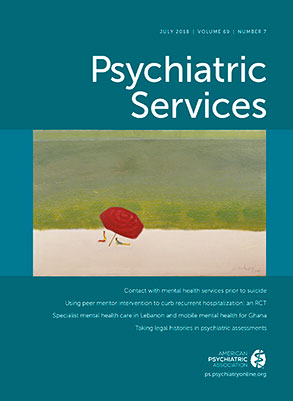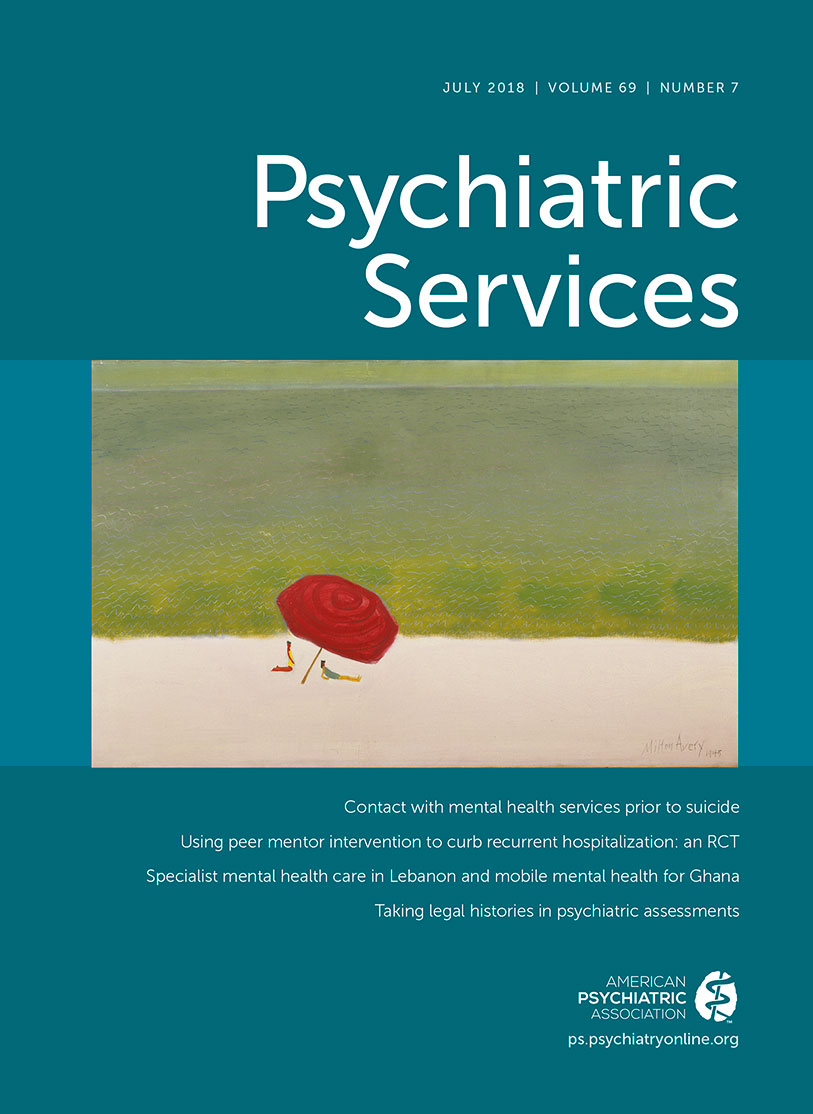I recently returned from Ghana, a country of approximately 27 million residents in sub-Saharan Africa. Like much of the region, Ghana faces enormous mental health challenges, including lack of mental health professionals and clinical infrastructure, poor or inconsistent access to medication, and pervasive societal stigma around mental illness (
1). As a consequence, thousands of Ghanaians have mental illness that goes undiagnosed and untreated, and many are abused—chained and confined for weeks, months, or years at a time. [A photograph is available as an
online supplement.] This situation cannot persist.
Although underdeveloped in mental health care, Ghana is remarkably advanced in telecommunications. It was one of the first countries in Africa to have access to the Internet and a mobile cellular network. This infrastructure has grown dramatically over the years and is quite robust today. It is exactly the type of context where innovative mobile health (mHealth) approaches could help to address significant unmet public mental health needs (
2).
To assess the viability of mHealth for mental health in Ghana, I met with psychiatrists, psychologists, nurses, health care trainees, patients with mental illness and their family members, telecommunication company officials, and Ghana’s Minster of Health. In the south I visited with the University of Ghana’s School of Medicine and toured one of the country’s three psychiatric hospitals. In the north I spent time with a nongovernmental organization that provides outreach and mental health services in the community (BasicNeeds) and with a Christian charitable organization that provides education and health services to the predominantly Muslim population in the neighboring villages (King’s Village). In the city of Tamale, I toured the Shekinah Clinic, which provides basic medical care services to the most impaired and indigent residents, many of whom have psychiatric conditions. I met with the community’s traditional healers, pastors, and prophets and visited a large Pentecostal prayer camp where people with mental illness and developmental disabilities were shackled to concrete slabs and forced to live in crowded and extremely unhygienic conditions—an environment that eclipsed anything I have seen in the most austere psychiatric inpatient or criminal justice settings in the United States. Hundreds of similar prayer camps exist in the region (
3). The conversations, observations, and experiences I had in Ghana left me with several strong impressions.
Ubiquity of Mobile Technologies
Multiple telecommunication companies compete to offer Ghanaians affordable data plans and devices. Mobile phones and strong 3G wireless networks are accessible in much of the country. Locals access Facebook, WhatsApp, and other social media via their mobile devices. Every health care professional and government representative I met owned at least one mobile phone—typically a “smart” device with access to the Internet and the capacity to host apps. I met with people with mental illness and their family members in the rural north as part of their monthly community support meeting, and most owned mobile phones or reported having owned one in the past. In a gathering of a dozen members of the Association of Traditional Healers of Mental Illness and Epilepsy, several completed the attendance sheet by using an inked thumbprint rather than a handwritten signature. Their limited literacy, however, did not block their use of mobile technology; when prompted, each and every person showed me his or her mobile device, be it a flip phone, Android, or iPhone. Similar to what is seen in developed countries, mobile technology permeates all walks of life in Ghana.
Mobile technologies with preinstalled content could serve as tools to scaffold traditional healers’ decision making and interactions with patients or to deliver resources directly to individuals with mental illness and their family members. Content could be designed to build self-management skills, for example, or to counter stigma. Audio and video players built into smart devices such as tablets and smartphones could facilitate the delivery of psychosocial and educational content in modalities other than written text to overcome barriers associated with low literacy (
4). Digital content could be delivered via personal devices or, perhaps more economically, disseminated in communities as a digital library available on a touchscreen tablet computer that is circulated among village residents. The possibility of avoiding being chained and confined might be a powerful incentive to engage.
A New Target for mHealth: Advancing Human Rights
Abuses of people with mental illness are not unique to Ghana; this is a pervasive problem in low- and middle-income countries (
5). Similar practices were common in Europe before Dr. Philippe Pinel and advocates for compassionate care began to demonstrate moral treatment of patients with severe mental illness, well before the advent of tranquilizers and other pharmacological restraints. If this shift occurred in 18th-century France, it could certainly be cultivated in digitally connected 21st-century Ghana.
I learned that using chains as restraints is locally thought of as an inexpensive, low-tech, nonpharmacological means for management of individuals who are disruptive or aggressive or who pose a flight risk. Consistent with the literature on physical restraint of people with mental illness in Africa (
6), no one described chaining as punitive. Prayer camp staff explained to me that the chains protect people from their own mischief and the societal consequences that might ensue. In our conversations, staff and healers expressed their discomfort with these approaches, stating they would use alternative approaches if they had any. Perhaps these were real qualms, or perhaps these were attempts to appear more compassionate to an outside observer. Regardless, I believe there is an opportunity here to introduce basic principles of moral care via widely available technologies.
Before my trip, I expected traditional healers to be apprehensive about openly discussing their practices, for fear of scrutiny. My expectations could not be further from the truth. Entrepreneurial men and women advertise their spiritual powers openly, including offering magical ointments via television infomercials. Recent research has suggested that traditional and faith healers are willing to engage and collaborate with health care professionals and clinical researchers if there is mutual acknowledgment and respect (
7). These sentiments were also expressed by the healers I met. Regional efforts to evaluate the utility of such collaborations are under way. I learned that healers have begun to organize, forming professional networks that seek recognition and formal ties for consultation and referral. Social media could strengthen these communities and, over time, these platforms could be used to disseminate guidance on administration of basic de-escalation strategies, mindfulness, aggression management, relaxation techniques, and other alternatives to mechanical restraint or confinement.
Integration of the Evidence Based and the Spiritual
Ghana is predominantly Christian in the south and Muslim in the north. Animistic beliefs are common. Spirituality infuses all aspects of life, including commerce, education, politics, and health care. Religious figures and spiritual gatherings are featured on prominent billboards on the sides of major thoroughfares and are announced on radio broadcasts. Television stations regularly depict sermons and mega-church events. General assemblies and official professional meetings are often begun and concluded with a public prayer. Pastors, imams, and persons regarded as prophets are highly respected in the community. Most Ghanaians with mental health challenges will consult with local religious leaders and healers before they seek the services of mental health professionals (
8).
In this highly religious context, developing mental health interventions that try to bypass, ignore, or undermine the long-standing beliefs of the population would be foolhardy. Integrating evidence-based intervention strategies with spiritual and religious teachings seems more accessible, acceptable, and consistent with the social fabric and context. Pastor Ben Owusu-Sekyere of King’s Village explained to me how he often found the biblical parable of Job to be instrumental in explaining to those who believe they are cursed with mental illness that they too are loved, protected, and cared for by God and thus deserve compassion. These individuals and their communities can be encouraged to use the blessings God has for them–offerings that may come in the form of teachings, medications, and digital health resources.
Conclusions
I left Ghana feeling optimistic about the willingness of relevant stakeholders to consider new models of care. I was encouraged by their openness to mHealth. Those who had never heard of mobile interventions were excited to learn about the work that is being done in developed countries focusing on mental health. Those who had some familiarity were excited to explore how these innovations could be culturally and contextually adapted to the Ghanaian context. Ghana has leapfrogged through several stages of telecommunications development. Wireless networks and mobile devices are now available where landlines and desktop computers never existed. By leveraging these technologies, perhaps innovative mHealth could facilitate similar leapfrogging in the development of accessible mental health resources (
9).

